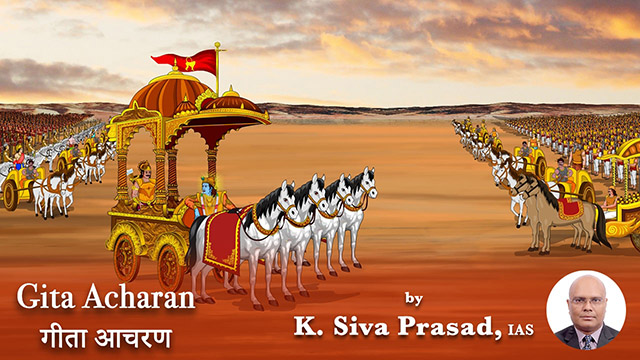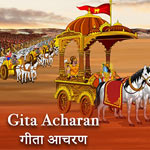
Krishna says that through Vedic rituals one fulfils the desire of entry to heaven and enjoy the subtle pleasures (9.20). After the expiry of their 𝙥𝙪𝙣𝙮𝙖 (good karma), they come back and keep travelling in this cycle (9.21).
The general interpretation is that the 𝙥𝙪𝙣𝙮𝙖, attained through vedic rituals, takes us to heaven after life and we come back once they are exhausted. Another interpretation is possible if attaining contentment by fulfilling desires is taken as entry to heaven. Out of ignorance, one depends on vedic rituals to fulfil desires and attain contentment from 'outside' like people and material possessions. On this path, one returns back to misery as one can never get eternal contentment through these ever changing situations. The true contentment can only come from the unchanging self.
Further, duality (𝙙𝙬𝙖𝙣𝙙𝙬𝙖) is the law of nature where everything exists in its polar opposite. If heaven is taken as a feeling of pleasure polarity, one will enter into pain polarity in due course of time. These two scenarios are nothing but the return back from heaven.
Krishna immediately gives a path as well as assurance that to those who worship Me thinking of nothing else, ever United to Me by incessant worship, I grant them 𝙔𝙤𝙜𝙖 (union) and 𝙆𝙨𝙝𝙚𝙢𝙖 (wellbeing or bliss) (9.22). This is an oft quoted verse of Gita as Krishna grants 𝙆𝙨𝙝𝙚𝙢𝙖 (wellbeing) as well as 𝙔𝙤𝙜𝙖 (ultimate union) with HIM (𝙔𝙤𝙜𝙖-𝙆𝙨𝙝𝙚𝙢𝙖 𝙫𝙖𝙝𝙖𝙢𝙮𝙖𝙢) to the devotees who are on desireless path towards HIM.
This is the path of contentment with self which was termed as 𝙎𝙩𝙝𝙞𝙩𝙖-𝙥𝙧𝙖𝙜𝙣𝙖 (stoic) (2.55) in 𝙎𝙖𝙣𝙠𝙝𝙮𝙖 (awareness) 𝙔𝙤𝙜𝙖 where one casts off all desires by breaking their begging bowl. From a 𝘽𝙝𝙖𝙠𝙩𝙞 𝙔𝙤𝙜𝙖 point of view, this is the desireless surrender of devotees where the Lord protects them and takes care of everything.

